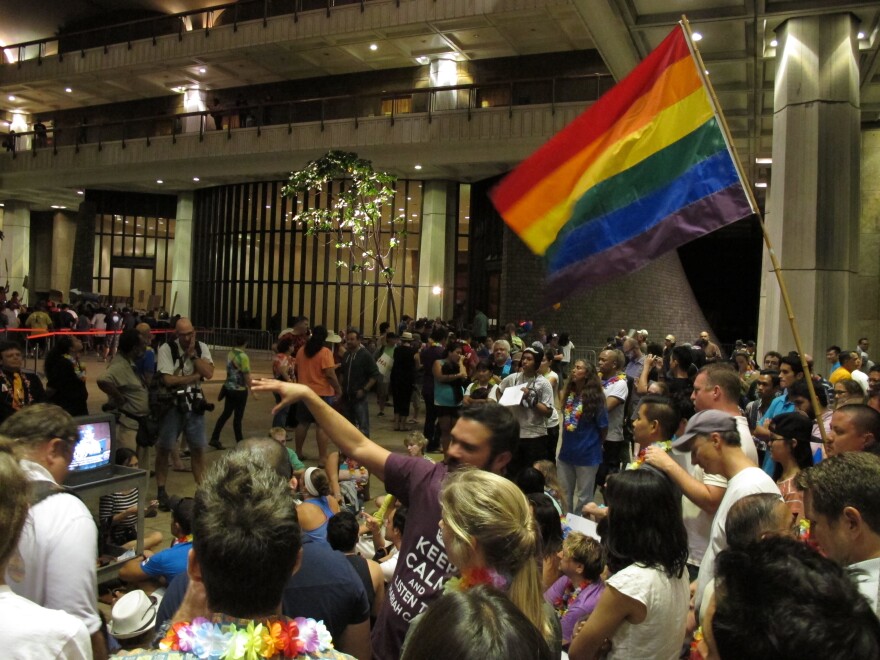A section in the Hawaiʻi State Constitution threatens marriage equality for same-sex couples. Now, lawmakers are considering a constitutional amendment to remove it.
Hawaiʻi legalized same-sex marriage in 2013 with the Hawaiʻi Marriage Equality Act. However, Article 1 Section 23 of the state constitution still reads: "The Legislature shall have the power to reserve marriage to opposite-sex couples."
House Speaker Scott Saiki has introduced a bill to remove that language and put a constitutional amendment to a vote.
Section 23 was put into the state constitution in 1998 after 69% of Hawaiʻi voted in favor of it.
Retired Judge Dan Foley said there was backlash from the Legislature and the public after the Hawaiʻi Supreme Court was the first in the world to rule in favor of same-sex marriage in the 1993 case Baehr v. Lewin.

Foley argued the historic case on behalf of same-sex couples.
“The adoption of Section 23 Article 1 of our constitution is a sorry point in our history,” he said.
“It was the only time Hawaiʻi has ever adopted a constitutional provision to take away rights from a minority. It's the only time they designated a minority in the Bill of Rights for discrimination, and it's still there.”
Foley said anti-LGBTQ activist groups were pushing the state Legislature from 1994 to 1996 to put a clause in the constitution to ban same-sex marriage, and they targeted the lawmakers who were resistant to it until the message was sent. The 1997 Legislature ultimately decided to put the constitutional amendment to voters.
The 1997 Legislature also passed a companion bill that allowed for some rights of marriage to be given to those who did not have the right to marry — for example, with shared health insurance.
Foley said that the pressure to pass the companion bill came from the Senate because legislators felt guilty about passing the constitutional amendment.
He recalled the emotional election night in 1998. Foley said the LGBTQ community reserved a ballroom in the Ilikai Hotel to watch the voting results come in on the constitutional amendment.
“I remember I had a couple of hundred people in front of me, same-sex couples, who were crying, who had just been rejected by their community, who were just denied equal protection of the law, who were just stripped of the victories that they achieved in court,” he said.
“That was a very painful moment.”
The Change 23 Coalition is fighting to amend the constitution. Its chair, Jeff Hong, said that it’s becoming more important to solidify protections for same-sex couples as LGBTQ rights have become increasingly threatened at a federal level.
“People don't realize that you leave these mistakes in your constitution,” he said. “There's similar things happening with abortion rights in many jurisdictions, they're like 'This is a done deal,' and then pow, right after the Dobbs decision, abortion is illegal in their jurisdictions, right? And so you don't want to leave it in there.”
Hong referred to U.S. Supreme Court Justice Clarence Thomas's concurring opinion in the Dobbs v. Jackson Women's Health Organization case that overturned the right to abortion access in 2022. Thomas wrote that the court should also reconsider its ruling that codified same-sex marriage federally.
For advocates of the constitutional amendment, it can be important to have assurances for LGBTQ people that same-sex marriage in the state is protected. LGBTQ Legacy Foundation Board Chair Haʻaheo Zablan said that although this current Legislature is not introducing any bills that would limit marriage for same-sex couples, that doesn’t mean future ones won't.

“We don't know that for sure, you know the next five to 10 years,” Zablan said.
“For us, it would be huge to know that there is zero discriminatory language in the state constitution, full stop.”
Saiki's bill to ask voters to amend the constitution and remove Section 23 will be heard on Wednesday in Rep. David Tarnas' Judiciary and Hawaiian Affairs committee.
The measure is particularly significant for Tarnas because he and Saiki were two of just six legislators in 1997 who voted against the Section 23 constitutional amendment.
Tarnas said that he received death threats, and his no-vote cost him his seat in that election. He did not run for office again until 2016 when his family urged him to try again.
“I get all teary when I think about it because here I am 30 years later and I can actually take an important role as chair of the Judiciary and Hawaiian Affairs Committee to move forward a bill to correct the mistake that the Legislature did 30 years ago,” Tarnas said.
He was reelected to the House of Representatives in 2018.
The measure will need a two-thirds majority vote in both chambers to be put on the ballot in 2024. Amending the constitution requires approval from a simple majority of voters.
The last time the state amended the constitution was in 2016 when Hawaiʻi voted in favor of using excess general funds to pre-pay general obligation bonds. Without the amendment, excess general funds could only be used to provide tax refunds or supplement other funds in place for emergencies.






